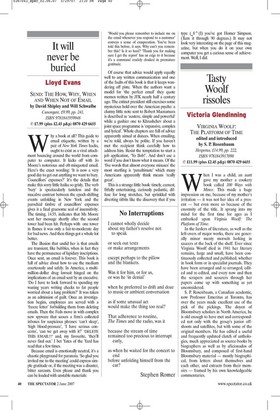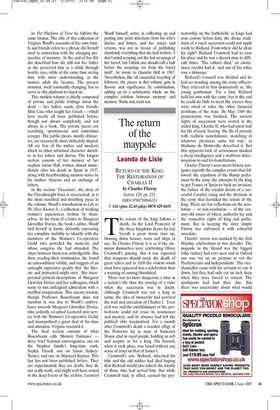Tasty Woolf rissoles
Victoria Glendinning VIRGINIA WOOLF: THE PLATFORM OF TIME edited and introduced by S. P. Rosenbaum Hesperus, £14.99, pp. 222, ISBN 9781843917090 © £11.99 (plus £2.45 p&p) 0870 429 6655 When I was a child, an aunt gave my mother a cookery book called 100 Ways with Mince. This made a huge impression on me, because of my mother's irritation — it was not her idea of a present — but even more so because of the enormity of the title. It sprang into my mind for the first time for ages as I embarked upon Virginia Woolf: The Platform of Time.
In the larders of literature, as well as the left-overs of major works, there are generally minor meaty morsels lurking in saucers at the back of the shelf. Ever since Virginia Woolf died in 1941 her literary remains, large and small, have been continuously collected and published, whether in book form or in specialist journals. They have been arranged and re-arranged, edited and re-edited, and every now and then the scrapers and scourers through her papers come up with something as yet unconsidered.
S. P. Rosenbaum, a Canadian academic, now Professor Emeritus at Toronto, has over the years made excellent use of the pick of the pickings. The doyen of Bloomsbury scholars in North America, he is old enough to have met and corresponded not only with the group's junior offshoots and satellites, but with some of the original members. He has edited a useful and frequently updated clutch of anthologies, much appreciated as source-books by biographers as well as by aficionados of Bloomsbury, and composed of first-hand Bloomsbury material — mostly biographical, from letters about themselves and each other, and extracts from their memoirs — framed by his own knowledgeable commentaries.
In The Platform of Time he follows the same format. The title of this collection of Virginia Woolfs accounts of her own family and friends refers to a phrase she herself used in connection with the changing perspective of memory. At the end of her life she described how she still saw her father as she perceived him as a child, through hostile eyes, while at the same time seeing him, with more understanding, as the mature adult she became. The present moment, itself constantly changing, has to serve as `the platform to stand on'.
This modest volume is chiefly composed of private and public writings about the dead — her father, aunts, close friends, Miss Case who taught her Greek — which have nearly all been published before, though not always completely, and not always in a book. The private pieces are searching, spontaneous and sometimes scrappy. The public pieces, mostly obituaries, are necessarily more delicately shaped. All are free of the malice and mockery which so often informed character sketches in her letters and diaries. The longest section consists of her memoir of her nephew Julian Bell, written almost immediately after his death in Spain in 1937, along with heartbreaking memoir-notes by his mother Vanessa and an exchange of letters.
In the section 'Occasions', the story of the Dreadnought hoax is resurrected, as is the most troubled and troubling piece in the volume: Woolf's introduction to Life as We Have Known It, a collection of working women's experiences written by themselves. In the form of a letter to Margaret Llewellyn Davies, the book's editor, Woolf tied herself in knots, defiantly expressing her complete inability to identify with the members of the Women's Co-operative Guild who provided the material, and whose congress she had attended. The abyss between them was unbridgeable. But then, reading their testimonies, she found an extraordinary vitality, and nuggets of an untaught expressive quality that `the literate and instructed might envy'. She incorporated portrait-descriptions of Margaret Llewelyn Davies and her colleagues, which seem to mix unfeigned admiration with a muffled exasperation. This uneasy tension, though Professor Rosenbaum does not mention it, was due to Woolf's ambivalence towards Margaret Llewellyn Davies, who ardently co-opted Leonard into service with the Women's Co-operative Guild, and monopolised a great deal of his time and attention. Virginia resented it.
The final section consists of what Rosenbaum calls 'Memoir Fantasies' — three brief fictional extravaganzas, one on the Stephen family's long-time cook, Sophie Farrell, one on Saxon SydneyTurner, and one on Maynard Keynes. This last has not been published before. They are experimental; they are drafts; they do not really work, and might well have rested in the deep-freeze of the archive. Leonard Woolf himself, active in collecting up and putting into print selections from his wife's diaries and letters, and her essays and reviews, was not in favour of publishing absolutely everything that she had written: 'I don't mind scraping out the last scrapings of the barrel, but I think one should call a halt before the scrapings are from the barrel itself', he wrote to Quentin Bell in 1967. Nevertheless, like all successful recycling of leftovers, the pieces in this volume gain in flavour and significance by combination, adding up to a satisfactory whole on the complex relation between memory and memoir. Waste not, want not.





















































 Previous page
Previous page